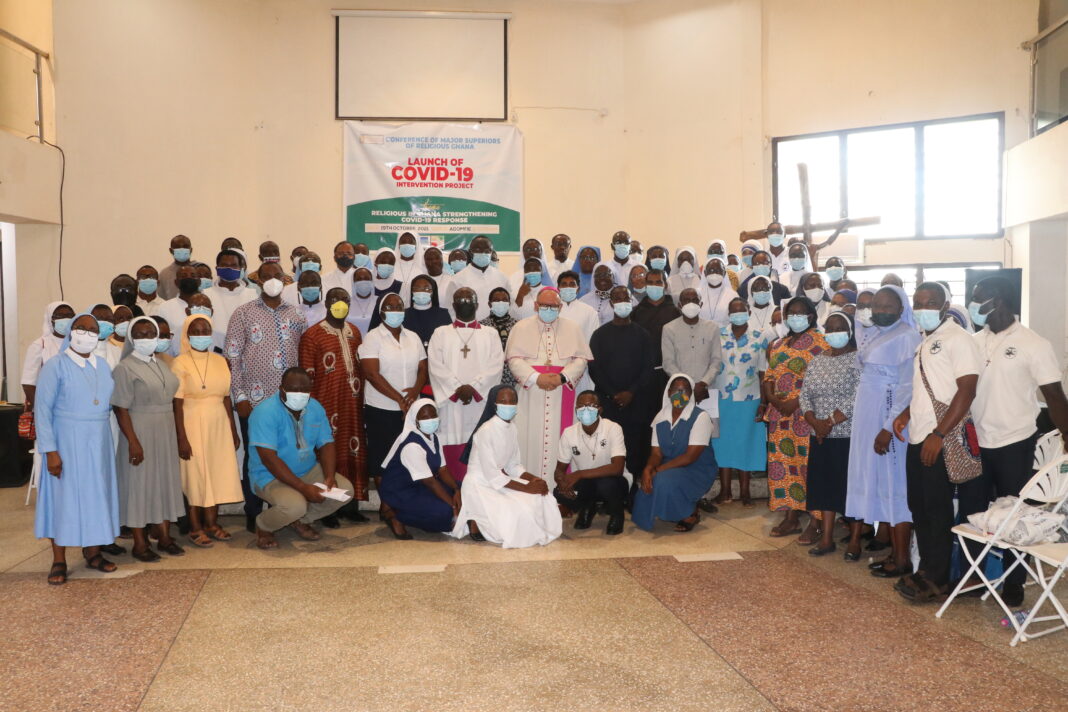As the Conference of Major Superiors of Religious in Ghana (CMSRG) embark on a project dubbed: “Religious in Ghana Strengthening Covid-19 Response,” the National Catholic Health Service at the National Catholic Secretariat, Accra says it is available to provide any assistance and guidance that might be needed to achieve the Project.
CMSRG is a registered body in Ghana with a membership of about 70 Religious Institutes (local and international), representing over 1500 members of whom 70% are women.
With Financial support from the Hilton Foundation, the goal of the project by the CMSRG among other things is to ensure that members of the Conference of Major Superiors of Religious Ghana become aware, have knowledge on, embrace the COVID-19 vaccine as an example to the communities they work in, and educate marginalized communities and the populace at risk of COVID-19 on the safety precaution of the pandemic.
It is also to demystify the myth surrounding COVID-19 vaccines in Ghana through comprehensive education and advocacy on the vaccines, put up sisters-led advocacy through engagement with key stakeholders towards ensuring access to available COVID-19 vaccines by people and communities on the margins of society and to partner with state and private institutions to undertake the planned activities to ensure effectiveness and avoid duplication.
Addressing participants at the launch of the Project at Adomfie in the Catholic Archdiocese of Kumasi on October 15, 2021, the Director of the National Catholic Health Service, Mr. George Adjei commended the Conference of Major Superiors on the initiative to undertake Project.
He called on Managers and Staff of the National Catholic Health Service to offer support and cooperation to those at the forefront of implementation.
“My assurance to you therefore, based on what I know and have experienced, is that the Church in Ghana is even more poised to do more especially in areas where health care is inadequate to augment government efforts to provide care for all,” he said.
According to Mr. Adjei, the Church from the Vatican has supported the efforts of the National Catholic Health Service with relevant PPEs for use by frontline staff, adding, the Ghana Catholic Bishops’ Conference too has been swift in mobilizing resources through Church societies, groups and individuals to donate materials such as sanitizers, tissues, Veronica buckets and assorted PPEs.
Others are provision of educational material and messages to educate the public hrough the pulpit. Clearly therefore, the Church has supported in no small way in this Covid-19 response.
Mr. Adjei stated that the Church in Ghana has played and continues to play her part in this mandate of Jesus Christ as the history of the Hospitals especially is quite similar.
Most Hospitals, he noted, were started as part of the evangelization ministry of the early missionaries; sometimes in garages and under sheds and they gradually evolved into big Hospitals with all the basic medical specializations we have today. Others have been started by the Arch/dioceses as well.
“We are therefore happy to say that the NCHS today comprise 47 Hospitals, 81 Clinics, 11 Health Training Institutions, 3 specialized institutions and 2 rehabilitation homes,” he stated, saying, “Ten years ago, the Hospitals for example were 36. I must quickly add that the Health Facilities Regulatory Authority (HeFRA) has accredited 3 as secondary level facilities.”
He added: “Clearly, the Church in Ghana is alive to the mandate of Christ to bring health to the sick.”
According to the NCHS Director, the technological advancement explosion has also caught on with our facilities and all of them have acquired one equipment or the other. In fact, Hope Xchange Hospital around the corner has one of the most sophisticated medical equipment in the country which supports service delivery.
The NCHS has been known to provide training, particularly, for Nurses since immemorial, through the numerous Health Training College annually, he said, adding, “We are also known for Specialist Medical Training dating back to the 1970s in Europe.”
In fact, many of the current or immediate past managers and health sector policy makers have been beneficiaries of this training. Now that most specialist training is available locally, we still sponsor and train our workforce beyond the Doctors.
The Directorate, he pointed out, has also, over the years, hosted several initiatives and projects to improve health outcomes across the country. Notable are the Project Fives Alive! funded by the Bill & Melinda Gates Foundation and the Mental Health Project sponsored by Grand Challenges Canada.
Another, he said was the Pooled Procurement Programme of the NCHS which has since 2012 helped to reduce the cost of medicines and other inputs by an average of 30% which in turn reduces cost for the non-insured patient.



